До востребования / Poste Restante - feedback
Получила очень интересный и чуткий отклик на книгу До востребования от Наталии Драчинской, которая сейчас живет в Калифорнии, и Ната разрешила поделиться им с вами.
I received a very interesting and sensitive response to the book Poste Restante from Natalia Drachinskaya, who now lives in California, and Nata has given me permission to share it with you (in English below)
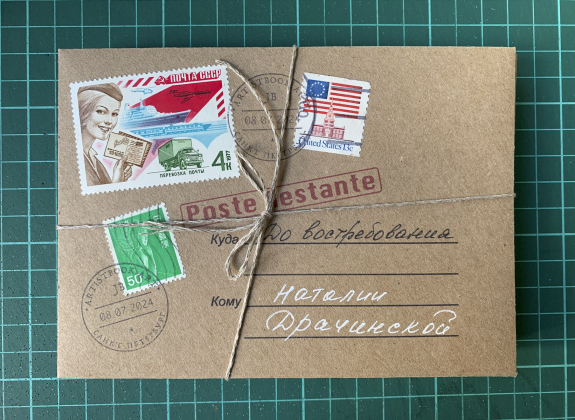
Книжка пришла! Почтальон принес в ящик. Спасибо тебе за такой прекрасный почтовый конверт. Российские марки - я не ожидала, что они вызовут у меня такие теплые чувства. Рябчик широколистный... Тысячелетник дваждыпильчатый... и все остальные - отдельный восторг. И твой адрес с литерой А... Отдельное спасибо за американскую марку на коробочке! Я оценила ))
С годами твои нитки становятся еще тоньше, и крепче. Помню, как меня восхитили нитки в Let me fall again. Такие тонкие, но они оказались очень прочными - было проверено мной во время переездов. Здесь еще тоньше. Удивительно ювелирная работа с шитьем. И тончайшая работа с бумагой. Где ты находишь столько разных бумаг? Очень сильная идея и сильная форма. Письма, конверты, почтовый адрес - это как паспорт дома, в котором ты живешь. Спасибо тебе за эту книгу! Я очень рада, что мой конверт стал частью книги. Кстати, второй конверт у меня был про московские тапочки, которые я с собой вожу по городам и странам. Вчера я их выбросила. Я теперь не боюсь жить в других местах, могу жить без этой ментальной пуповины. При этом чувствую связь с Россией также чутко, ценю все то, что она мне дала и дает.
Я, конечно же, прочитала все конверты. С начала до конца, а потом с конца до начала. Такие разные мысли... и ты очень правильно написала в тексте, что все меняется, мы меняемся, наш дом и наши представления о нем меняются. Особенно увиделось, что именно у российских участников проекта встречается такое пронзительное воспоминание о доме детства, о месте где вырос, с особенной тоской по утерянному. И это чувство такое больнючее бывает, если накатит. Конечно же, я знаю про "древнерусскую тоску", много раз слышала )) Но только сделав zoom out поняла, что она есть и что она действительно свойственна жителям России. И что далеко не все на планете понимают, о чем речь и могут подключиться к этому смыслу. Мы на днях беседовали с соедкой-канадкой о том, что сильная разница во временах года дает более глубокое проживание и переживание жизни, с тоской и меланхолией в холодное время, с ожиданием весны, с радостью лета. В Калифорнии климат ровный - тут всегда как будто лето (зимой просто холодное). И тут нет этой синусоиды чувств в зависимости от сезона. В северных штатах там да, там такое есть. Соседка подтвердила )) Она выросла в Калгари. Удивительно, во всем английском языке нет точного эквивалента слова "тоска". Есть меланхолия, хандра, депрессия, а вот тоски нет. И как это объяснить? И почему в России она есть? Также я увидела, насколько в США другое отношение к дому. Переезды здесь в порядке вещей - ты выбираешь университет и переезжаешь учиться в другой штат, потом ты ищешь работу и переезжаешь в другой штат, потом ты можешь выбрать штат, где меньше налогов/ больше демократов/ более подходящий тебе климат/ есть горы/ есть океан. Получается, что как-будто понижается "ценность" стен, повышается ценность человеческих отношений с близкими, и появляются новые отношения с местом. Хотя много и тех, кто никогда никуда не переезжал. Еще одна история про дом: художница рассказывала, как она регулярно приезжает на место, где был ее родительский дом, где она выросла. А у дома растет лимонное дерево, за которым ее семья ухаживала, они вместе собирали урожай. Так вот она регулярно приезжает к этому месту - дом там уже другой отстроили, побольше, в вот дерево все то же. И она там обязательно крадет несколько лимонов. Для США - это смело, тут же везде частная собственность)) даже на плодовые деревья. Взрослая женщина, которая тырит лимоны с дерева, - для меня это был сильный образ. Но не из серии "тоска", а из серии "печенья Мадлен" у Пруста. Разница не только в щемящем болевом ощущении в области сердца, а еще и в том, что печенья они тебя морально поддерживают. Чувствуешь поддержку дома и становишься устойчивее. А тоска нагружает и стопорит. И, поскольку я сейчас много работают с темой неудобных воспоминаний и сложного прошлого, я знаю, что есть механизм трансформации болезненного в укрепляющее.
--------------
The book is here! The postman brought it to the box. Thank you for such a beautiful postal envelope. Russian stamps - I didn't expect them to evoke such warm feelings. The broad-leaved grouse. Thousand-leaved twin-sprinkle tree, and all the others are a delight. And your address with the letter A..... Special thanks for the US stamp on the box! I appreciated it ))
As the years go by, your threads get even finer, and stronger. I remember being delighted with the threads in Let me fall again. So thin, but they were very strong - I've tested them during moves. Here it's even thinner. Amazingly jewelled sewing work. And the finest paper work. Where do you find so many different papers? Very strong idea and strong form. Letters, envelopes, postal address - it's like a passport to the house you live in. Thank you for this book! I am very happy that my envelope became part of the book. By the way, the second envelope I had was about the Moscow slippers that I take with me to cities and countries. I threw them away yesterday. Now I am not afraid to live in other places, I can live without this mental umbilical cord. At the same time, I feel connected to Russia just as sensitively, I appreciate everything that it has given me and is giving me.
I read all the envelopes, of course. From beginning to end, and then end to beginning. Such different thoughts.... and you very rightly wrote in the text that everything is changing, we are changing, our home and our ideas about it are changing. I especially saw that Russian participants of the project have such a poignant memory of their childhood home, of the place where they grew up, with a special longing for the lost. And this feeling is so painful if it comes on. Of course, I know about ‘Old Russian longing’, I've heard it many times ))) But only after zooming out I realised that it exists and that it is really peculiar to the inhabitants of Russia. And that not everyone on the planet understands what it is about and can connect to this meaning. The other day we were talking to a Canadian woman about how the strong difference in seasons gives a deeper living and experiencing of life, with longing and melancholy in the cold time, with the expectation of spring, with the joy of summer. California has a flat climate - it always feels like summer here (it's just cold in the winter). And there's not this sine wave of feelings depending on the season. In the northern states there yes, there is such a thing. My neighbour confirmed it )) She grew up in Calgary. Surprisingly, there is no exact equivalent for the Russian word 'toska’ in the entire English language. There is melancholy, moping, depression, but there is no longing. How do you explain it? And why does Russia have it?
I also saw how different the attitude to home is in the US. Moving is the order of the day here - you choose a university and move to another state to study, then you look for a job and move to another state, then you can choose a state where there are less taxes/more Democrats/more suitable climate/ there are mountains/ there is an ocean. It turns out that it's like the ‘value’ of walls goes down, the value of human relationships with loved ones goes up, and there's a new relationship with a place. Though there are many who have never moved anywhere. Another story about home: an artist told how she regularly visits the place where her parents' house was, where she grew up. And outside the house there is a lemon tree that her family used to take care of, they used to harvest together. So she regularly comes to this place - the house there has been rebuilt, bigger, but the tree is still the same. And she steals a few lemons. For the U.S. - it's brave, there is private property everywhere))) even on fruit trees. A grown woman stealing lemons from a tree was a strong image for me. But not from the ‘yearning’ series, but from Proust's ‘Madeleine's biscuits’ series. The difference is not only the pinching painful sensation in the heart region, but also the fact that biscuits they support you morally. You feel the support of home and you become more stable. And homesickness is stressful and stagnant. And, because I'm working a lot with the topic of uncomfortable memories and a difficult past right now, I know there is a mechanism for transforming the painful into the strengthening.
------------
...
Огромное тебе спасибо за книгу! Ехала она до меня почти три недели, но доехала. (Ната Драчинская)
...
Thank you so much for the book! It took almost three weeks to reach me, but it did. (Nata Drachinskaya)
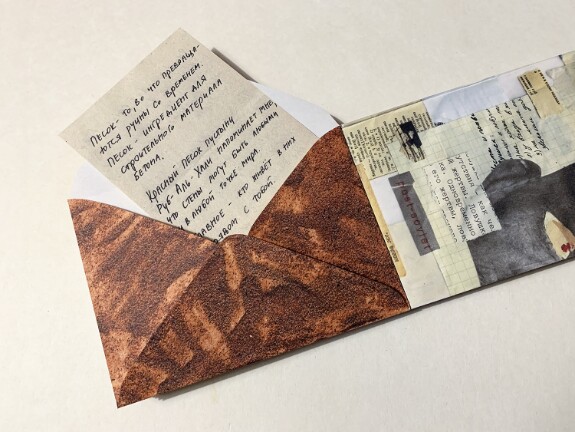
Work by Nata Drachinskaya
И я благодарна Нате за то, что она поделилась своими мыслями. Я рада, что книга вызывает столько размышлений, потому что каждый из нас, участников, вложил в нее часть своего опыта и рассказал о своем чувстве дома, в котором конечно отразилось время, в котором мы сейчас живем. Мне будет интересно взглянуть на эту работу через 5 лет, 10, 20, пусть их будет как можно больше, чтобы мы успели построить свои дома и наполнить их любовью.
And I am grateful to Nata for sharing her thoughts. I am glad that the book is so thought-provoking because each of us, the participants, put into it part of our experience and talked about our sense of home, which of course reflected the times we live in now. I will be interested to look at this work in 5 years, 10, 20, let there be as many as possible, so that we have time to build our homes and fill them with love.
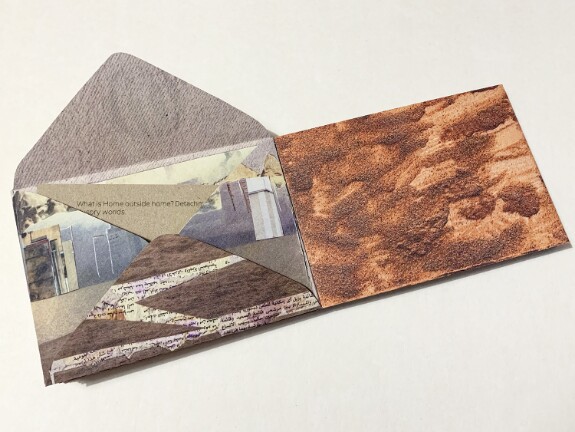
Works by Nata Drachinskaya and Natalya Dyurich
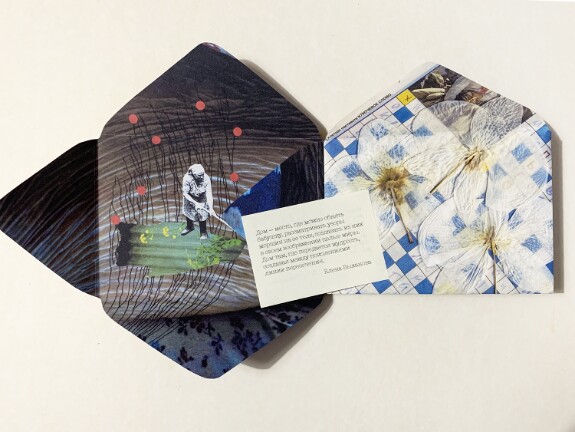
Works by Elena Bykhanova and Julia Borissova
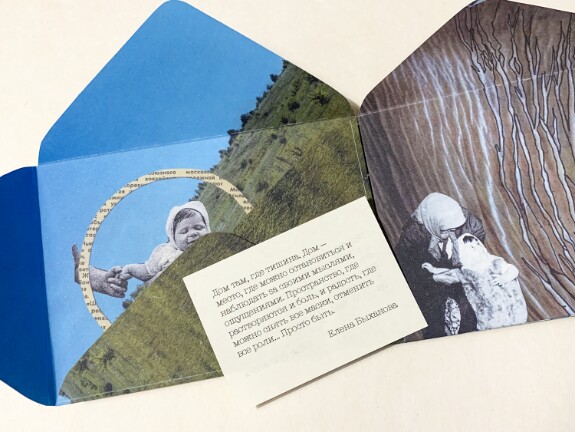
Work by Elena Bykhanova
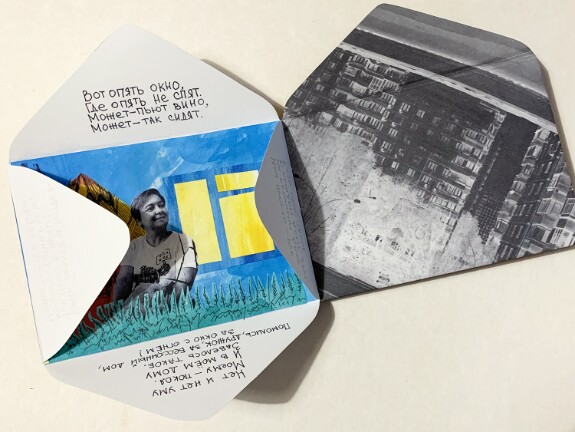
Works by Elena Govorenkova and Anna Poloneeva
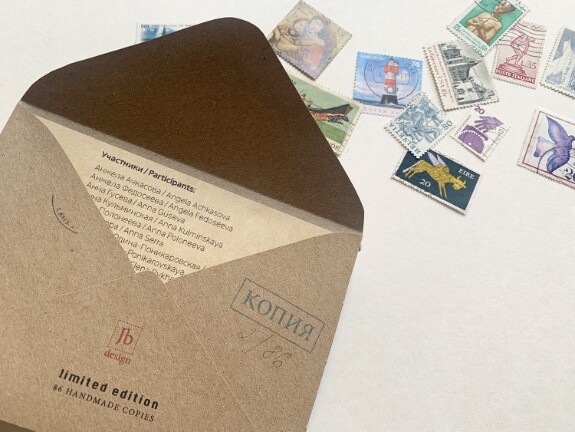
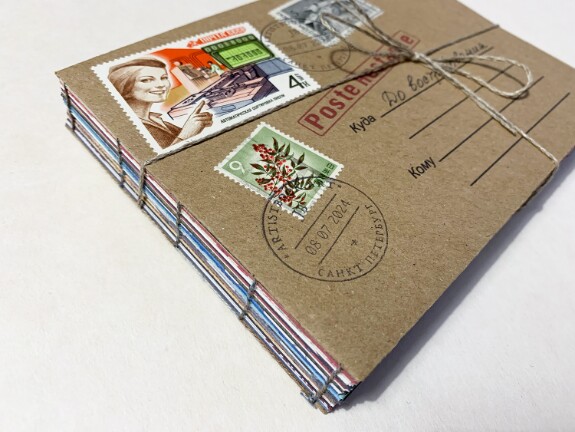
До востребования
Книга художника
Ограниченное издание - 86 копий
+ 14 копий - специальное издание
Poste Restante
Artist's book
Limited edition of 86 copies
+ 14 copies Special Edition
Contact: giuliaborissova@gmail.com







